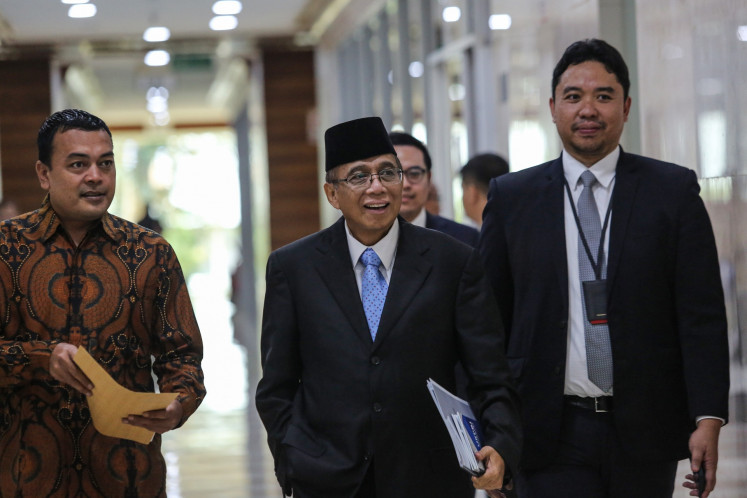Popular Reads
Top Results
Can't find what you're looking for?
View all search resultsPopular Reads
Top Results
Can't find what you're looking for?
View all search resultsIndonesian democracy and political normativity
In the midst of the public outcry resulting from the Bank Century scandal, one hears endless strains of political analysts commenting, whether on television or in print journalism, on the dissonance between the institution of democracy and the establishment of clean governance
Change text size
Gift Premium Articles
to Anyone
I
n the midst of the public outcry resulting from the Bank Century scandal, one hears endless strains of political analysts commenting, whether on television or in print journalism, on the dissonance between the institution of democracy and the establishment of clean governance.
This cycle, many argue, is what creates the feeling that democracy in Indonesia is going nowhere. Many came to the conclusion that the only way forward was to re-examine and re-establish the democratic foundations of our country.
While these analyses draw our attention to the flaws of democracy as practiced in Indonesia, these problems perhaps more pressingly urge us to revisit our understanding of political norms or what poli-tical philosophers call political normativity.
Liberal democracy, at least in theory, has been understood as the ideal state in which to organize a people's political aspirations. Practices not in accordance with such a state have long been viewed as flawed.
Rather than positing the experience of Indonesia as a case of flawed democracy, however, one should reconsider the theory that liberal democracy is a normal state of politics. I would argue that exceptional cases of "flawed democracy" are what enable us to consider the question of liberal democracy as the political normativity.
In order to do this, we must first situate our understanding of political norms in a historical perspective, and second, we must redefine the norms of politics in today's world.
Let me turn to the first task. Many of us have been trained and schooled to think of liberal democracy as the normative, virtuous and even the natural state of politics.
From the writings of the Enlightenment philosophers like John Locke and John Stuart Mill, students of government studies are taught to understand this particular Western political tradition is not only the ideal form of government but also one that can be duplicated in different times and spaces.
To counter such a homogenizing view of politics requires a look at the history of the formation of such norms. What processes led to the constitution of liberal democracy as the normative state of politics, and what made it possible?
What are the limits of such norms? Colonial governments, for instance, were absolutist in that they had unchecked power, albeit with a legitimate base in enlightenment political theory, but at the same time despotic, in assuming the division of law based on geographic delimitation.
Thus, an examination of the history of colonial governments would precisely indicate the limits of such norms. This approach would question the assumed universality of liberal democracy by demonstrating the historical contingency of such a system.
The next step is to look at contemporary political developments to redefine the current norms of politics. To go about this, one needs to look at instances of flawed, failed or dysfunctional democracies without necessarily positing them as anomalous to a particular ideal. Indonesia is just one of many examples of a flawed democracy.
Cases of money politics, demagoguery, corruption and armed militias are our everyday news consumption. Rather than treating them as flaws of an ideal political norm, we should rather take them to illustrate how our political theory, philosophy and ideals, are inadequate to understand these phenomena.
For example, Locke theorized that democracy would lead to clean governance because if an official were corrupt the public would punish him by voting him out of office. Such assumptions create an illusion of an integral relationship between democracy and clean governance.
But in contrast to Locke, we learn that a politician on corruption charges can get re-elected as the prime minister in Italy. We also hear that civilians are taking up arms in the suburbs of Milan to counter the increasing lawlessness.
Is it fair then to characterize these examples as pathological? That is, as cases of flawed politics? Perhaps we should come to an understanding that our perception of politics is not adequate to comprehend these cases. Or perhaps, the world we live in has become too complex and variegated for our enlightened predecessors to fully comprehend.
To say that flawed cases are pathological obscures more than it illuminates. In contrast, the two approaches described here will hopefully help us in comprehending different styles and patterns of politics not simply as flawed examples of an ideal political norm.
This means highlighting the limits of our prior understanding of political norms with their limited assumptions. Only in such a way may we able to understand that reason is not the only motor of politics, as the philosophers of the Enlightenment posited.
In our contemporary world, certainly in Indonesia, public passion is another phenomenon that is of utmost importance.
Yet if we subscribe to the belief of liberal democracy as the political normativity, then there can be no place in our schema for appreciating public passion. It seems that what we have understood as the normal state of politics was never a norm to begin with.
The writer is a doctoral student in anthropology and history at the University of Michigan, Ann Arbor.










